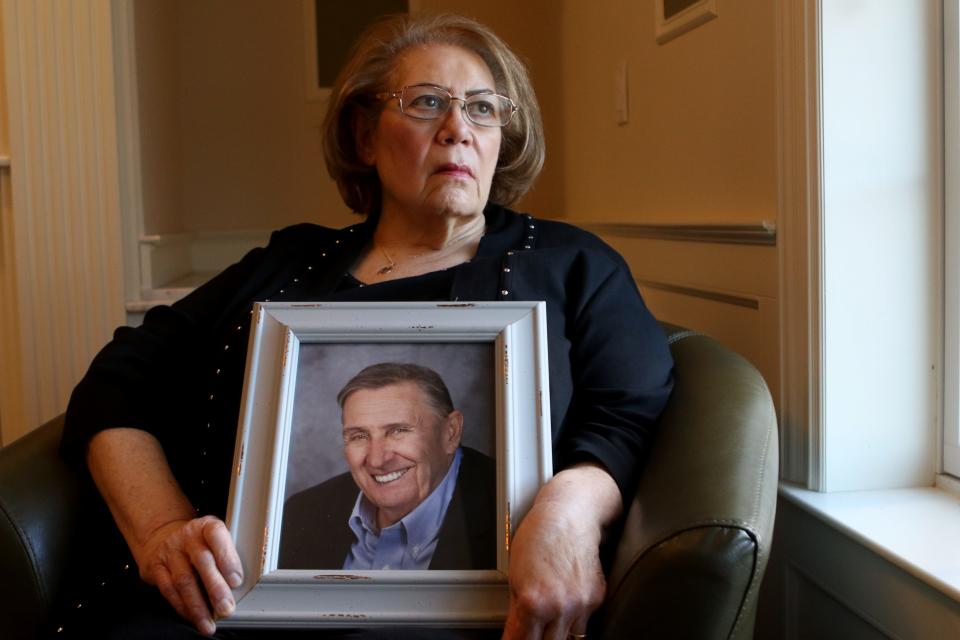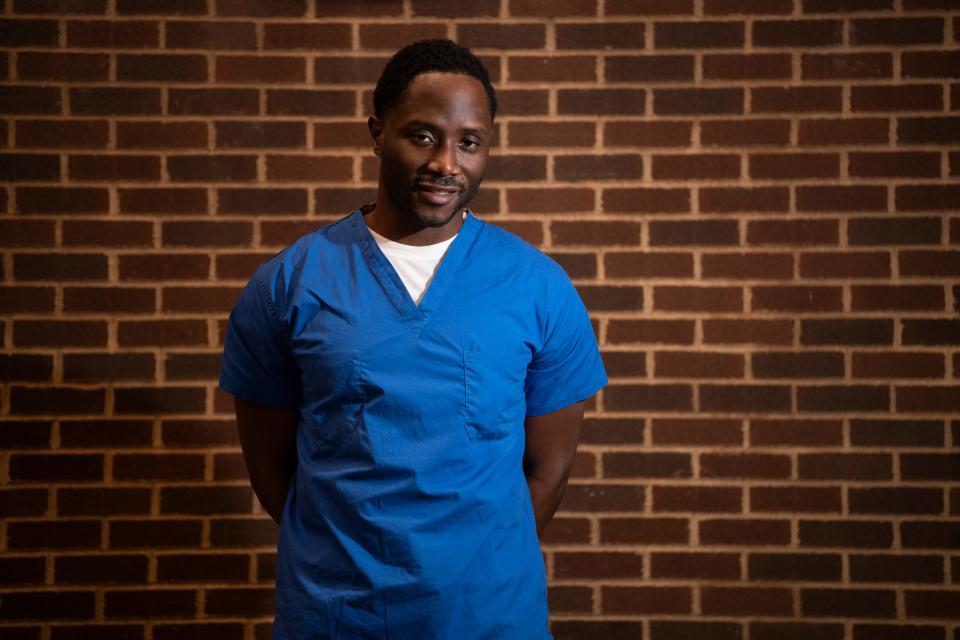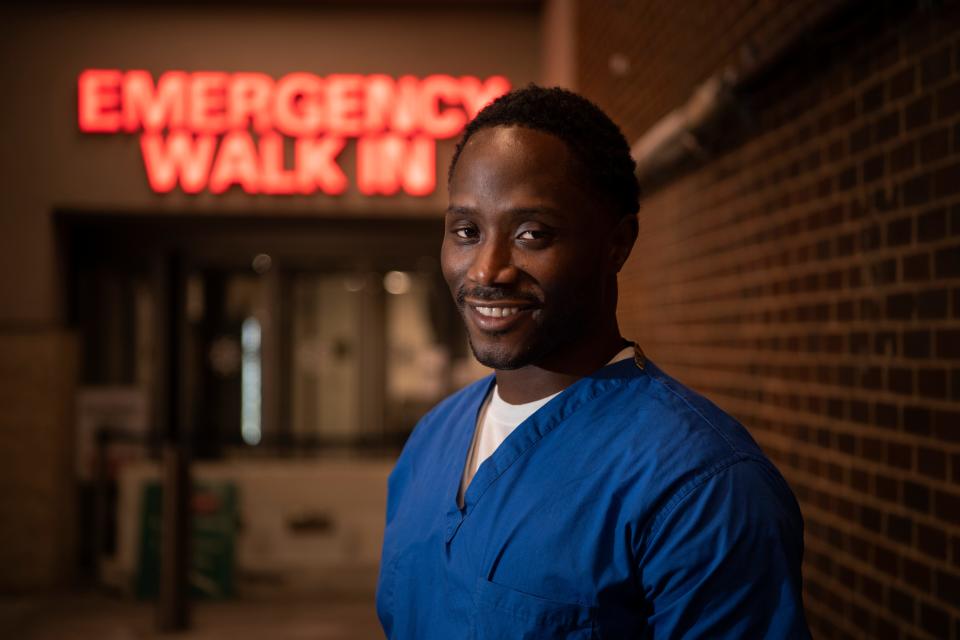On a dark day in the ER, an anonymous note saved her. Now, she's found its author.
HACKENSACK, N.J. – It's been said that angels appear in lion's dens, tombs, and prison cells.
So why not the emergency trauma department at a New Jersey medical center?
"Sometimes I would say to my late husband, show me a sign," said Carol Alamia of Rochelle Park, New Jersey, who was recently a patient at the medical center. "Please give me a sign."
This month, during one of the darkest days in her life, she got it.
It wasn't literally from an angel. Not unless an angel happens to be taking the form of one uncommon young man — whose acts of kindness, in the dark days of the pandemic, have made a huge difference to the patients in his hospital.
"He gave me something to hold on to," Alamia said. "He cared."
It's a story that begins on April 10 — when her husband, Vincent, died of COVID-19. He was 76.
"We were married for 49 years," Alamia said. "I loved him more than anything else in the world. He got sick on the fifth, the day after our anniversary. And he passed the 10th, the day before my birthday. On Good Friday."

Even before this, they'd had troubles. Of their three children, only one survived. Carol was in the hospital no fewer than 11 times. Together, they'd weathered it all, for 49 years. "Never, never, never give up" was the Winston Churchill quote on their refrigerator. Now, her husband was gone.
In February, she had to go back in the hospital, for a recurring trouble that dated back to the birth of her last child, 41 years ago. But this time, with her husband gone and with COVID rewriting the hospital playbook, things were different.
This time, she was alone.
"One of my friends would have definitely gone with me, but they couldn't," said Alamia, a retired middle school teacher. "You can't bring anybody in the hospital. I had to face everything by myself. What I was thinking was, 'My husband's gone. How am I going to make it in this world?'"
Five states are rolling back mask mandates: More could be on the way. Here's what it could mean for all of us.
Valley of despair
Those thoughts were overwhelming her as she lay in her gurney, lined up with a lot of other gurneys. The weight of the last six months — of the last 49 years — seemed to come crashing down on her in those hours. And this in a hectic ER, where the preoccupied staff had its hands full.
"I couldn't breathe, I felt so uptight," she said. "I just thought, how am I gonna get through this? I was trying to grab somebody's attention. And all of a sudden, I saw this young fellow."
She started asking him questions. Would she be seeing a doctor? A nurse? How could she get a COVID vaccination?
Then they began to talk more generally. She asked him how he was. How the COVID situation was affecting his job. At one point, his jacket opened and she saw a name tag: "Richie."
The conversation turned more personal. "I said to him, 'My husband passed away from COVID in April — he was in a nursing home, he had COVID, and he had Alzheimer's.' And I started to cry. And he said, 'I'm sorry. I'm really sorry.'"
Then her cellphone rang. Richie went on to other business. She never saw him again.
An hour later, another young man came over to her. "I have something for you," he said. He handed her a note. "Who is it from?" she asked. He replied: "It's to make you happy."
She said, "Nothing's going to make me happy tonight. " Then she opened the message.
"Hello. Heaven can be found in the most unlikely places, sometimes I believe we can find that in love. All endings are also beginnings. It's hard to notice during our hard times. Don't spend time thinking you are alone, because your husband's love surrounds you every day. A life does end, but love doesn't. You reminded me that the world is full of different stories, but the human spirit and all lives at some time converge. Thank you for sharing your story to a stranger. I'll remember how powerful love is. I hope you have a speedy recovery. Richie."
She was stunned. "I said, 'Does anybody know Richie?" And they said, "No, there are a lot of Richies.'"
She spent that night in a cubicle in the hospital, hooked up to the IV. "Every time somebody came in to check, I said, 'Do you know who Richie is?' All through the night, I kept reading the note.
"I thought, this has got to mean something. I've got to hold on to these words. They're going to get me through. But now, I haven't seen Richie. Nobody knows him. I thought, maybe he doesn't exist. Maybe he's just an angel."

She was discharged the next morning. She never found Richie.
"Richie got me through that night," she said. "I didn't know Richie. But he's my hero. Somebody brought him up right."
Somebody certainly did. Richie would be the first to say it.
Strangers who became heroes: The amazing ways people helped each other weather the Texas storm
Angels in disguise
"Along the way, through my life, I've had people who have picked me back up and have taught me the things that I told her," he said.
So yes — there is a Richie. He turns out to be Richie Clerge, 28, a clerical associate who has been working at Hackensack University Medical Center for about two years. And, it further turns out, this isn't the first time he's done something like this.

If he finds a patient he connects to, he'll write a little note.
"Nobody knows I do this; I keep it to myself," he said. "I don't want the accolades, a pat on the back. I do it because it makes me feel good inside to uplift somebody's spirit."
He's not, he stresses, some kind of do-gooder. But when the situation seems to call for it, he'll add a human touch to what can be a scary, impersonal experience. And Alamia's situation seemed to call for it.
"I could tell she was pretty upset, and I've been in her shoes," said Clerge, who lives in upper Manhattan. "I knew what that felt like."
His grandmother Valentin — "Mummy," he called her — died just last year. His uncle Michael, to whom he was close, died two years ago. So when Alamia started talking about the death of her husband, it struck a nerve.
"Not to sound morbid, but in a funny way death can bring strangers together," he said. "Having her tell her story to me, that moved me. I remembered those emotions she was feeling, because I have lost people in my life."
And the notes? Those, he is quick to point out, weren't his idea. He got the inspiration from a patient who left a note for him. He's just paying it forward.
"I met this patient, and she had a brain tumor, and she was young — 26," he recalls. " All I can recall is telling her not to give up. I didn't write her a note. She wrote me a note. She said I had a kind soul. That's what made me kind of write a little bit to patients that I feel I connected with, that are put in my path."
In one respect, Richie is wrong. His empathy has been noticed by his colleagues.
"It's not surprising," said Michael Kerr, Richie's boss, operations manager for the emergency trauma department.
"He does this day-in and day-out when he comes to work," Kerr said. "He interacts with people. The first thing you notice about Richie is that he's very good at expressing himself. He's able to take a normal situation, and make it a little better in the way he uses words."
For his part, Richie credits Kerr for establishing a culture of compassion in the department. Part of that involved turning Richie into a kind of morale officer for the team.
"He called me into the back office, I want to say six months ago," Richie recalled. "He says, 'These are for you,' and he hands me a set of markers. He tells me that I am in charge of inspiring the team."
So now, on the message board in the main hallway, along with updates and contact numbers, are little aphorisms. Richie writes them in Magic Marker. "No act of kindness, no matter how small, is ever wasted" — Aesop. Or, "It always seems impossible until it's done" — Nelson Mandela.
"Michael gave me the spark," Richie said. "I remember he said, 'It's going to be impossible to change everyone's experience in ER. But just try to change one person's experience. That's all I'm asking you.' I just took on that task early on. That's what motivates me to put a positive energy out there."
Then and now: See how Nashville is recovering one year after deadly tornadoes ripped through
All in the upbringing
Richie — naturally — was also inspired by his family. They made him who he is.
"The root word inspire means to come from within," he said. "Inspiration comes from the inside. Everything you do, you have to make sure you're working from the inside. Then it comes out."
From his father, he says, he learned to use his imagination. From his mother, he learned to listen.
"She would say, 'You don't know what people are going through. You can look at somebody and they're smiling all day, but hurting inside. So you treat people cautiously, and try to be kind to them."
And from his grandmother Valentin, he learned that he would never get it perfect — but that was no reason not to try.

"She would say, 'When you go out there, you have to do right. It's hard. Life is a balancing act, and you're not going to get it right all the time.' "
Sometimes, though, you do. Sometimes a nod, a pleasant word, a sympathetic note to a person who looks like she needs it, can make all the difference. "This is one of the times you can look back and say, 'I got it right,' " Richie said.
The point is not that Richie is some kind of angel.
It's that any one of us can be — if we choose to listen to the better angels of our nature.
That's what Abe Lincoln called the empathy and humanity of which we're all capable. And in these ugly times — times when the atmosphere seems charged with bad feeling, the way a thundercloud is charged with electricity — the story of Carol Alamia and her encounter with one good soul might be worth thinking about. We are all dependent on the kindness of strangers.
"Richie gave me the strength to get through," she said. "He just did the right thing."

She still has the note. It lives in the overnight bag she took to the hospital that day. "Right now, it's an active part of my life," she said. When she goes out, goes shopping, the bag goes with her. When she runs across a friend who seems interested, she'll take the note out and read it. She wants people to know about Richie.
"When you die, nobody cares about how big your house was, or how much money you made. What people care about is that you made them smile, that you helped them.
'With Richie, I think he's a rich man now. I hope he realizes that."
Follow reporter Jim Beckerman on Twitter: @jimbeckerman1
Texas mask rollback: 3 out of 4 Texas medical advisers say they were not consulted before Gov. Abbott lifted mask mandate
This article originally appeared on NorthJersey.com: After husband's COVID-19 death, she gets an anonymous act of kindness

 Yahoo Movies
Yahoo Movies 